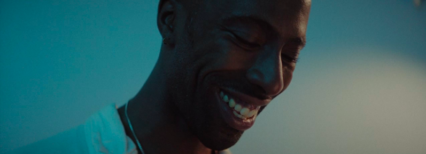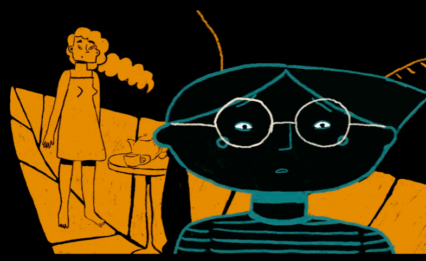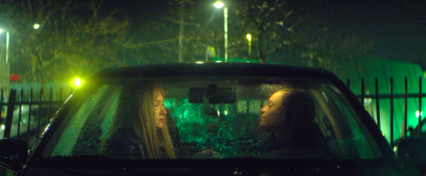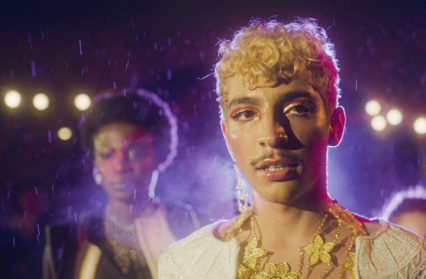Spanning an eclectic array of identities, nationalities and stories, Chloë Edwards offers a whirlwind round up of all the films nominated for the Iris Prize 2021.
As the largest short film prize in the world, the Iris Prize LGBTQ+ Film Festival celebrates and champions an astonishing breadth of beautifully diverse queer cinema in Cardiff each autumn. Now in its fifteenth year, and sponsored by the likes of Film4, BAFTA Cymru, Attitude and DIVA, the Prize enables its winner to produce their new LGBTQ+ short in the Welsh capital.
Partnering with internationally renowned film festivals globally, this year’s Iris Prize Festival brought together discussions, Q&A sessions with the individuals behind the films and the best of this year’s queer cinema. In a period where the vitality of community has been acknowledged worldwide, the 2021 Iris shortlist displays the significance of the arts in uniting and identifying with a community, one that can reach across the world.
This year’s ‘Best British’ shortlists were split into three thematic panels: ‘Resilience’, ‘Dark Days’, and ‘Smile’, displaying the range of evocations from each collection. Beginning with ‘Resilience’, this compilation comprises of tales of defiance and courage in complex and at times impossible circumstances.
Serving as a metaphor for the underground queer communities in countries that persecute LGBTQ+ individuals, Baba (2021, dir. Sam Arbor & Adam Ali) follows young queer Libyan Britannia on the eve of a British Embassy interview that may grant them asylum. With cultural nods not dissimilar to those of Derek Jarman’s Jubilee (1977), Baba’s beautifully shot exploration of family, faith, and self-identity explores the complexities of leaving one’s point of origin behind and rosy idolising of a new home, in a moving piece from Adam Ali and Sam Arbor dedicated to those hiding who they are, which was shortlisted in both the Best International and Best British categories. Powerful and resonating, Baba is a stand-out in this year’s nominations.

Elsewhere, Acrimonious (2020, dir. Olivia Emden) explores Emeka’s return to his working-class roots after a sudden divorce from his wealthy husband and examines intersectional identities and questions of gentrification. Split Sole (2021, dir. Barnaby Boulton) meanwhile is set against the backdrop of London’s housing estates and unfolds the romantic tension between two young men meeting secretly for dancing lessons, adopting a fresh approach to cinematic portrayals of urban working-class masculinities.
Further journeys of resilience are shown in Lesbian (2020, dir. Rosemary Baker), a commanding poem that seeks to reclaim the eponymous term by interrogating its derogatory uses. Finally, in Three Letters (2021, dir. Ian Smith), we witness disability and LGBTQ+ rights campaigner Ian Smith’s intensely personal and vulnerable reflections on his relationship with his father as he reaches out to him following the deaths of his stepmother and grandmother.
Following ‘Resilience’, the ‘Dark Days’ collection takes a deeper and more unflinching dive into contemporary issues affecting LGBTQ+ experiences, namely toxic masculinity, intolerance, and prejudice in the workplace (Factory Talk, 2021, dir. Lucie Rachel & Chrissie Hyde) and repressed sexualities, loneliness, and self-destruction (Baby Boy, 2021, dir. Greg Hall). Inertia (2021, dir. Mat Johns) depicts the bond between a pupil and grieving teacher, whilst Pop (2020, dir. Laura Margo Roe) follows a young boy exploring his identity away from bullies in the company of titular character Pop (Stephen Graham), recently released from prison. Lastly, the bittersweet Birthday Boy (2021) from director Leo Lebeau sees the bullying of transgender school pupil Alex reach its brutal climax on his sixteenth birthday at the same time that he discovers a friend in a fellow online gamer is a lot closer to home than he realised.
Already evident from the titles shortlisted in the Festival, these collections adroitly capture the nuances and relatability of moments in queer lives. In contrast to the grittier stories told by the films within the ‘Resilience’ and ‘Dark Days’ compilation, those within ‘Smile’ aim to make viewers do just that, with their tales of hope, blossoming romance, and optimism.
Both of director Emmalie El fadil’s creations (Cwch Deilen, 2020, and From A to Q, 2021), skilfully follow the vulnerability of burgeoning romantic relationships between women, each pair at a different point in their lives. The heart-warming, gentle animation of Welsh-language Cwch Deilen fits the metaphor for a couple learning to trust and commit to one another in a boat in a stormy sea, whilst the touching From A to Q puts a twist on the trope of a teenager falling in love with a best friend.

Friendship is a core theme running throughout this collection; whether it be the early stages of feelings that develop into something else, the relationships depicted in the films in ‘Smile’ all illustrate the vitality of being supported as yourself and loved for who you are. Silver & Gold (2021, dir. Jack Pulford) silently explores the attraction between two living statues in what begins as a rivalry between workers, in a stunning testament to performance art. Dragged Up (2021, dir. Laura Jane Tunbridge) challenges the parental expectations of a young woman competing in regional beauty pageants who would prefer to channel her creativity into her drag king persona, in a film that also incorporates a relationship with neighbour Scout that gradually loses its frosty beginnings and develops into something more meaningful. Rounding off this impressive category, S.A.M. (2020, dir. Neil Ely & Lloyd Eyre-Morgan) takes a look at queer love and disability from the perspective of two young men with superb lead performances from both principal actors.
Alongside films depicting the familiar landscape of LGBTQ+ lives in Britain, the first collection within the Iris Prize International shortlist offers insights to queer rights, freedoms, and restrictions globally. Baba (2021, dir. Sam Arbor & Adam Ali) features once again here, alongside an affirming documentary of a teenage girl Gerry-Ottawa’s transition in a First Nation community in Manawan, Quebec, (Pitoc e icinakosian, 2019, dir. Gerry Ottawa & Jos-Onimskiw) and is shot from the perspective of Gerry’s brother.

One film in this collection doubles as a music video. Russian indie band Sansara dedicated their video for the song ‘We Will Become Better’ (2021, dir. Andzej Gavriss) to Russia’s LGBTQ+ community a year after legislation defined marriage as a union between a man and a woman. The video, which uses dance to portray a couple apart, is an affecting and striking nomination in the category.
Set in the rural Iran overlooking the city, the protagonist of And Just Two More (2021, dir. Alireza Mohammadi) seeks the recognition of himself and his mannequin partner in the census population records in a film that holds up the mirror to who and what deserves to be officially recognised as existing and living. Eggshells (2020, dir. Slava Doytcheva), which takes place in Bulgaria, follows two women who return home for Easter and navigate the response of their families to their relationship.
‘Family’ also offers its own portfolio of films striving for the International Prize. You Will Still Be Here Tomorrow (2020, dir. Michael Hanley) wrenchingly depicts a son repeatedly coming out to his father, who is in the late stages of Alzheimer’s, whilst The Binding of Itzik (2020, dir. Anika Benkov) follows a Hasidic bachelor pursue his sexual preferences online, away from his family’s knowledge. Do I Know You? (2021, dir. Rioghnach Ni Ghrioghair) takes a contemporary approach to questions of family, by introducing a donor into his biological daughter’s life, as well as those of her initially unaware mother and new girlfriend.

Youth narratives take centre stage in ‘Young Hearts Run Free’, which begins with Bonde (2019, dir. Asaph Lucas), and the energy of a group of young queer friends and their daily and night lives in São Paolo, with sobering insights of the prejudice they face from the police and on dating apps. The Understated Before the Eruption (Antes de la Erupción) (2020, dir. Roberto Pérez Toledo follows a group of school friends returning to their annual holiday destination after the recent announcement that one of the group is transgender, and their acceptance of her revelation. Bonhomme (2020, dir. Thomas Raoul) involves a realisation of sexuality in what begins as a meaningless dare but has deep-running consequences for the young protagonist of this French short. Attractions are also felt between two teenage boys in a fleeting encounter aboard a night train to Stockholm in The Night Train (Nattåget) (2020, dir. Jerry Carlsson), as two worlds collide by chance.
Chance encounters form the basis of another collection of nominations, with each story detailing the impact sudden attraction can have. Must Be Painful (2020, dir. David Semler) takes place in a Czech train station during bad weather, where a gay Spanish-speaking couple become the subjects of homophobic remarks from another pair unaware that one of the men speaks Czech and understands them. The Song We Sang (2020, dir. Aarti Neharsh) follows two women who spend the night together after meeting at the Hindu festival of Navarati and decide where to take their relationship, as A Present Light (Luz de Presença) (2019, dir. Diogo Costa Amarante) follows a chance meeting on the streets of Portugal. Realising sexuality in later life is depicted in Buffalo (2019, dir. Freddie Paul), as a writer struggling to put words on paper finds himself attracted to the man delivering his dinner.

‘City of Night’ meanwhile combines tales of desire with unflinching narratives between a sex worker and drug dealer (Butterflies (Vlinders), 2020, dir. Liza Koifman), and anonymous meetings on the urban sprawl of the Philippines (How to Die Young in Manila, 2020, dir. Petersen Vargas). A stranger rocks the relationship of a couple he is invited to spend the night with in Private Photos (Fotos Prividas) (2020, dir. Marcelo Grabowsky), before a trip to 1985 New York in The Hunter (2020, dir. Sam McConnell) prompts a couple to address questions of race, class, and disease.
Cross-generational and cross-cultural shorts form the nucleus of ‘Respect Your Elders, Protect the Young’. A gender-fluid student in Berlin is caught between two cultures as they follow their heart in Berlin whilst being tied to their Vietnamese heritage in Jackfruit (2020, dir. Thuy Trang Nguyen). Meanwhile The Leaf (2021, dir. William J. Zang) explores the director’s own debates around returning to his family in China or remaining open in his sexuality in America amidst the racism and unemployment tied with lockdown under Trump, leaving him ‘rootless’ as described by a relative on the phone. Lastly, Between Us (2020, dir. Cailleah Scott-Grimes) is a frank explanation of a trans man weighing up a quiet life in rural Japan against his girlfriend’s wish to move to the metropolis of the capital. This refreshing and important collection deftly portrays questions of intersectionality and diaspora in each of its distinctive pieces.
Elsewhere, ‘Trans Power!’ shines a light on the discrimination faced by transgender individuals across the world whilst also serving as uplifting films that seek to clap back to those discriminating. De La Terreur, Mes Souers! (Terror, Sisters!) (2019, dir. Alexis Langlois) follows Kalthoum and her friends as they plot their revenge on those inflicting prejudice on them. In South Korea, God’s Daughter Dances (2020, dir. Sungbin Byun), talented dancer Shin-mi faces national military service and must figure out what to do.

The wittily-named ‘Beyond ‘Carol’’ champions films that centre on women-loving women relationships and strong female directors, with Lesbian again featuring here together with tales of a Muslim couple on the verge of a break-up (Noor & Layla, 2021, dir. Fawzia Mirza) in a plot structured around the five prayers of Islam. A secret romance between a music teacher and former colleague resurfaces when they perform together in Duet (2020, dir. Shae Xu), whilst A Summer Place (2021, dir. Alexandra Matheou) follows photographer Tina in the Cypriot city of Limassol and a chance meeting on her boat. The impact of the Covid-19 pandemic on love is told through the animated Are You Still Watching? (2021, dir. Alex Cardy, Tali Polichtuk, Kitty Chrystal), where protagonist Jamie escapes isolation and opts for sensuality through their imagination and on-screen romances. In a raw contrast, En Ce Moment (2020, dir. Serena Vittorini) captures communication difficulties where a new couple spend lockdown together.
Lastly, in a collection of documentary shorts, Why Did She Have to Tell the World? (2021, dir. Abbie Pobjoy) demonstrates the changes in the lifetimes of the first lesbian couple to come out on Australian television, whilst A Big Life (2021, dir. Anna Brownfield) places an early part of the country’s transgender history under the lens. Johnita (2019, dir. Alon Reter) follows the titular singer after her appearance on Israeli reality television and the reality of her life with her Orthodox father as she reflects on her life and future. Not in Tanzania (2020, dir. Signe Rosenlund-Hauglid) features interviews with queer young Tanzanians in one of the over thirty countries in Africa where homosexuality is outlawed. With audio political and media reports and tales of harassment experienced, the film is a symbol of the power of short films, and a raw and vital insight into these lives. Though each Iris 2021 nomination offers an important and new angle on queer cinema, ‘True Stories’ in particular both cements how far the world has progressed and also highlights the efforts still needed to ensure the freedom and safety of LGBTQ+ lives across the world.
You can find out more about the Iris Prize 2021 here.












